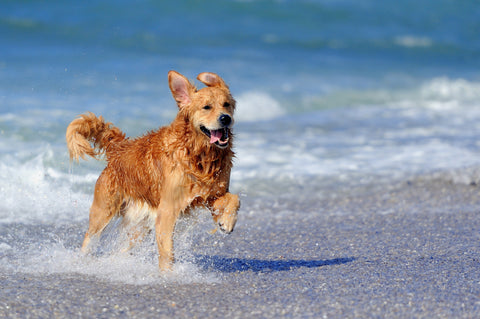Activity Level: High
Hypoallergenic: No
Social Ability: Highly Social
Skills: Hunting, Service, Sporting, Swimming
Intelligence: Above Average
Ideal Climate: Cool/Temperate
Golden Retrievers have been a beloved breed in the western world for over a hundred years, thanks to their eager-to-please nature. Long fur and loving eyes make these canines easy to love and snuggle with. Happy to fill a role and complete tasks, this breed lives up to its name with a love for fetching and sporting, especially if swimming is involved as well.
Breed Overview
 Origin: Mysterious record books dating back to 1835 reveal the truth of the Golden Retriever’s origin, which were not released to the public until 1952. Centuries ago, on Scottish Lord Tweedmouth’s estate in Tomich, gamekeepers allegedly bred these canines which an emphasis on a trainable, trustworthy, and friendly nature. The first several generations excelled as working animals, earning the nickname the ‘ultimate gentleman’s hunting dog,’ and their skillset rapidly increased their popularity.
Origin: Mysterious record books dating back to 1835 reveal the truth of the Golden Retriever’s origin, which were not released to the public until 1952. Centuries ago, on Scottish Lord Tweedmouth’s estate in Tomich, gamekeepers allegedly bred these canines which an emphasis on a trainable, trustworthy, and friendly nature. The first several generations excelled as working animals, earning the nickname the ‘ultimate gentleman’s hunting dog,’ and their skillset rapidly increased their popularity.
In 2018, non-profit organization Golden Retriever Club of Scotland erected a bronze Retriever statue in the breed’s origin place of Tomich, Scotland, illustrating the adoration and respect humans have long held for their canine best friends.
History: In the twentieth century, Golden Retrievers quickly became a staple breed among service, sporting, and hunting dogs. Historically, black-furred Retrievers were preferred over lighter colors for hunting purposes. Adoption in the English aristocracy helped keep all shades from extinction, and generations of these canines began to join families from every class. Over time, Retriever’s gentle personalities and easy trainability have made the breed exponentially popular worldwide, and today people from all countries and cultures befriend these dogs and utilize their skills for hunting and companionship.
Breed Attributes
 Temperament: Friendly to a fault, Golden Retrievers are beloved for their social ability and are typically friendly with humans, fellow canines, and even other animals. Their loyalty to their pack may make them excitable in the face of something new, such as a guest at the door, but their trainable nature can help teach them to contain their emotions and keep them calm.
Temperament: Friendly to a fault, Golden Retrievers are beloved for their social ability and are typically friendly with humans, fellow canines, and even other animals. Their loyalty to their pack may make them excitable in the face of something new, such as a guest at the door, but their trainable nature can help teach them to contain their emotions and keep them calm.
Personality: While every dog is different, Retrievers tend to have sweet personalities as they enjoy helping their owners complete tasks. Golden Retriever separation anxiety is common due to their intense loyalty to their family; calming treats and training can help your dog become accustomed to being alone.
Ideal Owner: You! Any Retriever will be quick to steal your heart, and they can thrive in just about any loving and supportive environment. With a single owner or a large family, these canines enjoy socializing and do best with plenty of playtime and interaction. If you’re ready for a fluffy flurry of affection coming your way, you’re ready to adopt a Golden Retriever.
Fur Care

Grooming: Due to their thick double coat, light-colored Goldens require plenty of brushing and grooming to maintain healthy fur and help keep skin issues at bay. Daily brushing with a high-quality undercoat brush can help manage shedding as well as stimulate the skin to encourage healthy blood flow and nerve function. When it comes to keeping this outdoorsy canine clean, travel-friendly grooming wipes help extend the time between baths, tackling everything from muddy paws to sweaty fur. A nourishing whitening shampoo helps maintain a glossy, brilliant coat for these light-furred canines.
Shedding: Goldens are not hypoallergenic due to their high levels of shedding. Their double coat molts in the warmer seasons, as do most thick-furred breeds, however more shedding than usual can be linked to the dog’s diet. Low levels of nutrients such as vitamin E, Omega 3, and collagen may be connected to unhealthy fur and skin. A supplement such as Omega 3 Fatty Acid Chews nourishes skin, which in turn helps prevent excessive shedding.
Health
 Common Issues: Golden Retriever health issues include joint, ocular, and cardiac conditions that may be diagnosed with a veterinary examination. Eye problems for Goldens include cataracts and progressive retinal atrophy, both of which can cause blindness. Heart disease and Subvalvular Aortic Stenosis (SAS) are cardiac issues that may be passed down genetically as well.
Common Issues: Golden Retriever health issues include joint, ocular, and cardiac conditions that may be diagnosed with a veterinary examination. Eye problems for Goldens include cataracts and progressive retinal atrophy, both of which can cause blindness. Heart disease and Subvalvular Aortic Stenosis (SAS) are cardiac issues that may be passed down genetically as well.
Joint or hip dysplasia occurs when a dog has a congenital abnormality in their joint tissue, which must be seen by a veterinarian but may be managed with over-the-counter supplements. Powerhouse ingredients such as Glucosamine and Chondroitin, as found in Z-Flex Max Joint Support, provide nutritional support to boost tissue regeneration and maintain proper cushioning and flexibility.
Responsible breeding practices can generally produce healthy dogs, though they should be screened for the aforementioned conditions. Regular vet visits are essential for all breeds to check for these common health concerns.
Otic & Dermatological Issues: Golden Retriever skin allergies are common but may be managed with lifestyle changes, diet changes, and supplementation. An An immune-supporting multivitamin is a great place to start tackling your dog’s allergy symptoms.
To help prevent or manage otic and skin issues, skin and ears should be groomed and cleaned regularly. Veterinarians also recommend taking extra time to examine the ears for irritation, especially if the pet has allergies or chronic otic issues.
Nutrition: Goldens are genetically predisposed to obesity, which means careful monitoring of their caloric consumption and weight is critical. Treats should only be given for training purposes or as a reward. High-quality sources of protein and healthy fats are essential parts of a dog’s balanced diet and can include fish and poultry, and vets often recommend supplements to bolster nutritional intake such as a canine multivitamin.
Lifespan: 12-10 years
Physical Activity
 Training: Early training and socializing are essential for these excitable pups. Once they are seven weeks old and before four months of age, they should be introduced to a variety of people and places for socialization. Puppy training classes tend to work well for highly trainable Retrievers, as they are eager to please their owner.
Training: Early training and socializing are essential for these excitable pups. Once they are seven weeks old and before four months of age, they should be introduced to a variety of people and places for socialization. Puppy training classes tend to work well for highly trainable Retrievers, as they are eager to please their owner.
Exercise: As a sporting breed, Goldens require plenty of daily exercise and interaction. These active dogs make excellent companions for hiking, biking, and walking, but high-impact activities are discouraged due to their predisposition to joint issues. Mentally stimulating tasks such as fetching, tracking, or obedience activities keep canine minds active and may help reduce stress and anxiety levels.

Light Golden Retrievers offer love, affection, and excitement to any household or environment. From sporting to fetching, active play helps these canines feel their best, and they’ll be ready for a snuggly nap after playtime with their human best friend

